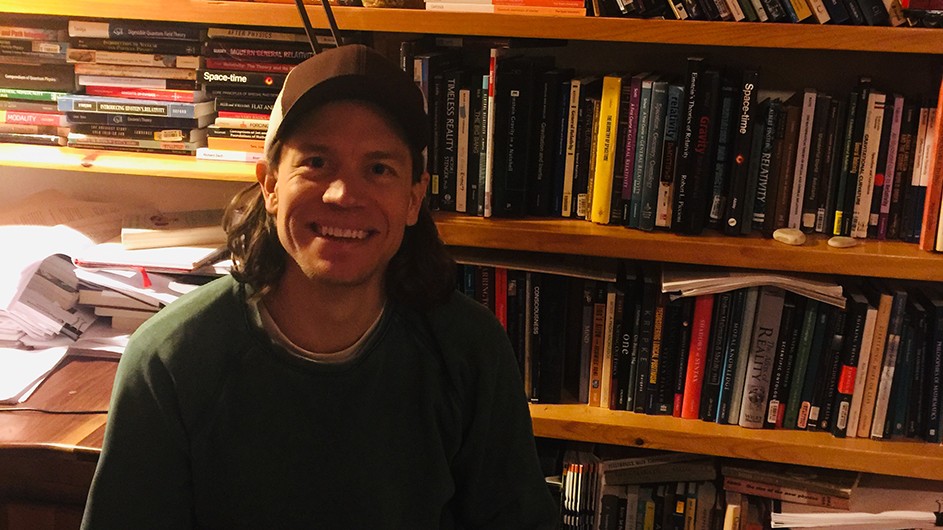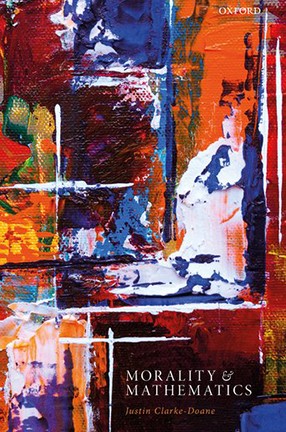Philosophy Professor Untangles Thorny Matters in His New Book
Justin Clarke-Doane asks the big questions in Morality and Mathematics.

For anyone who has the bandwidth to tackle both philosophy and mathematics at the same time, Philosophy Professor Justin Clarke-Doane’s new book is perfect. In Morality and Mathematics, the first book-length treatment of the topic, Clarke-Doane explores the similarities and differences between the two fields of knowledge.
He discusses the book with Columbia News, along with what he reads for pleasure, what he’s teaching this semester, and what he might serve at a dinner party.
Q. How did you come up with the idea for this book?
A. I had published a number of articles comparing morality and mathematics. What inspired the book was the realization that the comparison suggested a unified account of so-called a priori knowledge, one that pulled apart key concepts that philosophers had traditionally associated with each other.
Q. In the book, you argue that, contrary to popular opinion, our mathematical beliefs have no better claim to being self-evident or provable than our moral beliefs. How can that be true when so many mathematical problems have just one answer?
A. The term “mathematical problem” is ambiguous. One problem is: what logically follows from the axioms? Another problem is: what axioms are true? The former is a problem of metalogic, similar to the problem of whether some formulation of utilitarianism implies that we ought to kill the one to save the five in a given situation. In my view, such problems do have one answer, once we fix on a logic. But the latter problem is like the problem of whether utilitarianism itself is true. This is notoriously controversial! Many mathematicians naturally avoid taking a stand on whether, for example, the Axiom of Choice is true.

Q. What do you mean by moral realism and mathematical realism?
A. Realism about a subject, such as morality or mathematics, contrasts with views like relativism and constructivism. Realism says that there are facts about the subject, and these facts hold independently of our beliefs about said subject. So, moral realism is the view that there are facts about how we ought to live—what is good, and so on, and these facts obtain whether or not any of us says or believes that they do. Similarly, mathematical realism is the view that there are facts about prime numbers, metric tensors, etc., and these facts obtain independent of what any of us says or believes.
An important point of Morality and Mathematics is to distinguish realism from objectivity, the idea that in a disagreement only one of us can be right. Indeed, it is a consequence of the book that these concepts, which have been commonly identified, not only bifurcate, but are in tension.
Q. What sort of books do you read for pleasure?
A. Lately, I’ve been reading physics textbooks (nerdy, I realize).
Q. What's the last great book you read?
A. I am presently reading a book by my colleague, David Albert, Quantum Mechanics and Experience, while auditing a course of his that is based on the book. It is beautifully clear, notwithstanding the subject matter. I recommend it to anyone who wants to think hard about the underlying logic of the quantum (and, ultimately, macroscopic) world.
Q. What books are on your nightstand now?
A. I tend to get captivated by an area, and compulsively read about it (even when I should be doing other things). Lately, as I said, I’ve been reading physics, and, just now, philosophy of physics. So, I’ve got a general relativity textbook, some books on quantum field theory and the standard model, David’s book, and stuff like that. I’m new to this area, and have really been eating it up.
Q. How has the pandemic influenced your philosophical beliefs and practice?
A. I don’t think I’ll have a good sense of how it has affected my beliefs for at least a year from now. The pandemic has affected my practices surprisingly little. Unlike many sciences, philosophy doesn’t require labs or equipment. The main challenge is getting used to the virtual setting.
Q. Speaking of which, what are you teaching this semester?
A. Metaphysics (an undergraduate class) and Noncognitivism (a graduate seminar).
Q. You're hosting a dinner party. Which three academics or scholars, dead or alive, would you invite and why?
A. Yikes, I’m hosting? This really is a hypothetical! How about Dōgen, Carl Friedrich Gauss, and Simone Weil? Dōgen because of my longstanding interest in mysticism, especially Buddhist mysticism. Gauss because … how’d he do that? And Weil because—what a complicated person. Can I serve Bagel Bites?